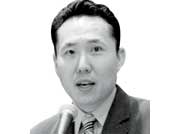Speech fee limit recommended for civil servants
The country’s anti-corruption agency called for restrictions in fees paid to civil servants for speeches made at private firms, especially high-ranking officials.
The Anti-Corruption and Civil Rights Commission announced a set of recommendations Thursday outlining the appropriate amount for fees depending on the rank of the official.
The maximum hourly rates recommended were 400,000 won for ministers; 300,000 won for vice-ministers; 230,000 won for directors; and 120,000 won for lower level officials.
It made the recommendations after a rising number of reports and criticism that government officials allegedly received “socially unacceptable” amounts in payment for public addresses.
The Civil Service Law does not have specific guidelines for the maximum amount of fees for guest speaking — some high-profile figures even ask for over 1 million won per hour, according to the commission.
“Such an amount is equivalent to the monthly salary for some workers in the country,” said Kim Je-soo, director of the Anti-Corruption Bureau under the commission.
Some government officials have neglected their duties, and focused on speeches to private firms to quickly make extra money.
“We came up with detailed recommendations to hopefully curb these money hungry lecturers,” said Kim, who also oversees the Code of Conduct Division under the commission. “Our guidelines are not legally-binding, but considering ministries, commissions and agencies of the government refer to our ordinances, I’m sure our guidelines will be effective.”
Civil servants should also report to their supervisors in advance if they plan to give speeches in return for money, detailing the subject, the name of the host, payment amount, number of hours and frequency. The government office where the speaker works will be asked to monitor the activities to make sure the regulations are being followed.
The commission will monitor any violations and will notify the respective offices at the end of each year.
“The collected data of violations will be effective once they’re used as a reference for anti-corruption evaluations during consideration for promotion,” Kim said. <Korea Times/Yi Whan-woo>

